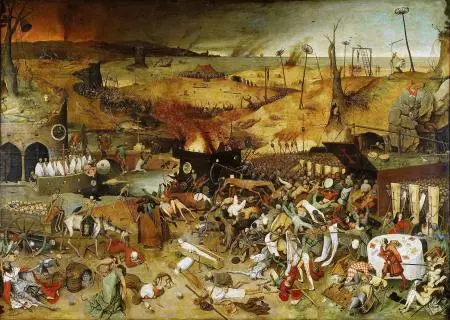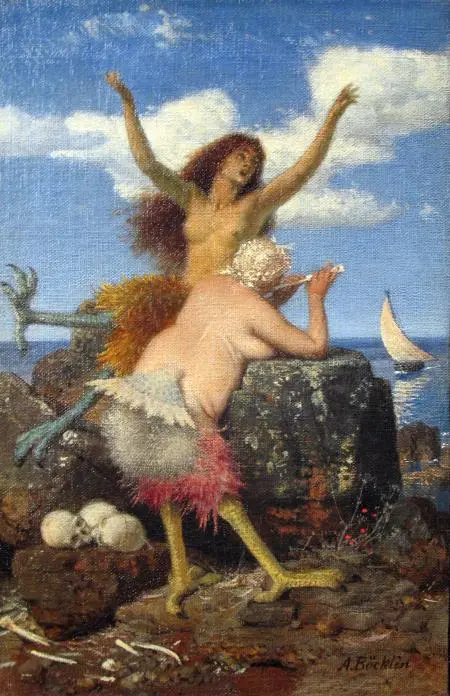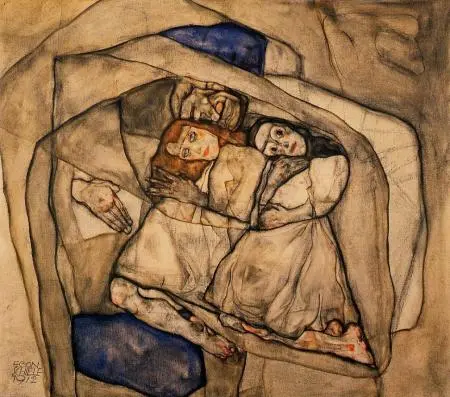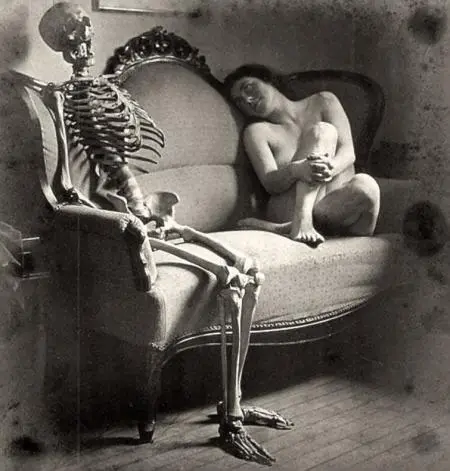We've all heard of the visual writing prompt, right? It's the exercise whereby you write a story based on a photo, painting, or some other visual medium. The great thing about being a writer is, you can dream up a story based on just about any image you see, even if the image in question isn't all that inspiring. The most mundane and seemingly innocuous items can, through virtue of a healthy imagination, become something wonderful and/or terrifying. Just ask Seanan McGuire, who turned a bowl of fruit—that staple still-life from art class—into one of the most unsettling short stories ever written, "Spores."
On the other end of the spectrum, however, are images that seem to brim with narratives. In their own silent way, they are telling a story to their viewers—a different story for every person, true, but a distinct, fully fleshed-out story nonetheless. Below you will find five such images, along with the stories these paintings and photographs told me. Take a look at these art pieces yourself, and tell us the stories you hear in the comments section.
Let's play.
1. Pieter Bruegel the Elder, "The Triumph of Death" circa 1562
(Note: You'll want to view as large a version of this painting as you can, so follow this link to do so.)
You may only enter Bruegel's glorious scene of discontinuance by invitation. You must wait in total silence and prostration. You must allow one of the legion dead to take your hand. You must feel the elegance of her phalanges caressing your wicked skin. You must accept her gift of flaying and remember the sanctity of pain. You must enter the mayhem wearing your old flesh face, in mockery of mankind. You must first commit acts of petty destruction, then graduate to more sacred and grisly deeds. You may then reveal your eternal face, the grinning skull of similitude.
You know this is the way and the truth. You can see your future, there, in the lower right-hand corner. You know your own face, don't you? You can see he is you, just before total ascension.
You will kneel now, yes? You will bow.
You will join us.
2. Arnold Boecklin, "Sirenen" 1874
"You know, if shit could talk, it'd sound just like that damn bone flute of yours."
"Shut up and keep singing, tart. They're almost here."
"You shut up, hag."
Pause.
"I get first choice this time."
"My ass. Who's the elder around here anyway?"
"I might be, if you'd die already."
"And then who would you talk to all day, hmm? The rocks?"
"I'd keep one of those sailors around as a toy. Cut off his you-know-what so he wouldn't be thinking about doing the deed all the time. Keep a constant hum going, always in the back of my throat, so he'll stay good and hypnotized. Then maybe I'd have someone to dance with, instead of fetching grog and blankies for a dumb fat old bitch who's got to hide behind a rock so the men can't see what a waste her body has become."
Pause.
"Insults aside...I actually kinda like the idea of keeping a few of 'em around. Good for chores and such."
"...Oh. Um...Thank you."
"Maybe with a few of 'em, we could keep their you-know-whats intact...Because, you know, you're no spring chicken yourself. We'll have to think about repopulating eventually..."
"That's a good point."
"Thank you."
Pause.
"So...I get first choice though."
"My ass, tart. You wouldn't even know what to do with a you-know-what even if it came with instructions. By Zeus, you're the dumbest thing I've ever seen, and I've seen some pretty dumb things in my time. You..."
And so on.
3. Egon Schiele, "Conversion" 1912
Entombed for eternity within the rock's surface, they are safe. Natalie, the redhead, wants nothing more than her God and lover to use her copper tresses as a pillow. His rosy right hand emerges like a flower through the granite and reaches for her thigh. Her left hand bears the rot of his suffering, and she is content.
You think I should be grateful? I despise you. My hand does not reach for your thigh. It wanders fruitlessly, in search of Lillian, whose hair does not burn my eyes like fire, yet warms my person as a bear-skin coat might. You cannot see the terror in her eyes, forced as she is to live here, the child in her stomach—our child—neither living nor dead, in a constant state of limbo. You have scarred the poor thing for life. You may punish me all you like, keep me here in this prison, but I beg of you, let her go. She is innocent. She had no knowledge of you.
At last there is peace. Her life before the rock had been washed in suffering. Born into poverty, from a woman already dead by the time the doctor slapped her behind, raised by a father who loved her with all the cruel perversity he could imagine (and his imagination knew no seemly borders), forced into dangerous, back-breaking labor by this same man, doing the work his wife should have done, if Lillian hadn't killed her coming into the world, and finally "saved" by a creature neither human nor inhuman, who never asked if she wanted to join his stable of companions and bear his child, he merely assumed as such because he could not fathom a woman who might choose otherwise. She would have preferred to be the champion of her own escape, but at least now Natalie keeps the rock from getting to her (a punishment worthy of Tantalus) and she will never have to birth this unwanted child. Lillian can do nothing more than sit and think. And despite what the rock thinks, it is quiet and lovely inside her mind, her thoughts like a gentle, babbling stream.
In this way, only the rock was displeased, and why not? He has enjoyed more pleasure than most men and women will ever know. Why shouldn't the imbalance of his existence endure a leveling?
It only seems fair.
4. Randy Heinitz, "Gettin' Hip to a Timely Tip" 2013 (Randy Heinitz, Flikr, CC BY 2.0)
Henry and his kids could hear the grymbles clawing and skittering inside the dilapidated old cafe, situated just off the dilapidated highway almost nobody used anymore.
"I'm going to keep one." Lucy said. She'd dressed appropriately for the occasion—tank top and jeans, the cuffs of which were tucked down into her combat boots.
"That's probably not a good idea," said Dylan, idly scratching at the five o'clock shadow already mottling her face. She took after her old man in that way, a heavy beard-grower (about the only way she resembled him anymore). Dylan had also worn a skirt today, and Henry feared she'd get bitten. They'd argued a good ten minutes outside her apartment building, and she'd told him flat-out he couldn't control what she wore anymore, then climbed into the CR-V and waited for him to drive.
Henry was still a bit miffed at his now-daughter, but at the same time, he had to agree with her. "Yeah, Lucy, you know these things aren't pets."
"I don't want it for a pet, Dad," Lucy said, without a trace of childish whining. "I just think maybe we might be able to learn more about them if we, you know, kept one around. Studied it. That's all."
It was happening with her too. Adulthood. Maturity. Which meant rebelliousness. Just like with Dylan. This whole thing with her was just a phase, just meant to get back at Henry for making her work so hard her whole life. She was like that kid he knew back in the day, Arnold Flemming, who started dressing like a lady so he could get out of the draft. And that's all it was with Dylan—just trying to get out of some work she didn't want to do. She'd come around.
Or maybe she wouldn't. Maybe he'd lose her completely and Lucy along with her, and there wouldn't be a damn thing he could do about it.
"Look," Henry said, "by the sound of it, there's more in there than the three of us can handle alone. I say we just torch the whole building and pick off any that escape."
Lucy gave her father a sidelong glance, but said, "Yessir," and cocked her rifle.
"Sir, Yes Sir," Dylan said, a little too loudly, and flipped the safety on her pistol.
Henry grabbed a good-sized stick from the overgrown grass just off the parking lot, wrapped it with an oily rag he found a few yards away, and lit the makeshift torch with his Zippo.
"Alright, kiddos, get ready."
They stood in a line, a united front against these vile grymbles—a strong, impenetrable wall, though Henry felt the individual bricks crumbling behind the facade of solidarity.
He said, "Here we go." Then, he added, "Maybe we could take a dead one back. Could maybe learn a thing or two that way."
Lucy looked at him. She nodded. "I could dissect it, at least."
"There you go," Henry said.
Dylan just stared straight ahead, waiting. Henry tried to say something to her...but he came up short. He'd figure something out eventually, though. Or at least he'd try.
"Okay," he said. "Okay."
He threw the torch.
5. Franz Fiedler, "Narre Tod, Mein Spielgesell (Fool Death, My Playmate)," 1922
I love him unconditionally, but he's always a million miles away. Especially after we...you know.
"Just tired," he says, but I think he's hiding something.
Last week, at Sara's brunch gathering, he made brief eye contact with a woman I'd never seen there before. She blushed and looked away. He stared after her for a moment before returning to his silent rumination and honeydew melon.
Later, at home, I asked him who the woman was, but he pretended not to know what I was talking about.
I try to picture it, that woman's big red lips kissing up his femur, his pelvic bone, his exposed spine and ribcage. Plunging her tongue in his waiting, gaping mouth, licking at his teeth. Just so that I can be prepared. I imagine I'll walk in on the scene for real eventually.
Sara thinks I'm crazy. Just making things up in my head. Particularly since she insists there was no woman at her gathering who looked even remotely like the person I described—big red lips, like caterpillars, jowls bristling with whiskers, arms that hung to her knees, one big eyeball situated in the center of her chest. Sara didn't know anyone that gorgeous.
She tells me I should count my blessings, even if he is cheating on me. Of all the women he could have had, even one so exquisite as the woman I described, he chose to marry me. To share his fortunes and spend his life with me. She says all the gals are jealous, they can't believe he chose me, with my plain pale skin and slim waist, two eyes and ample bottom. Especially when Sara is still single, and as smoking hot as she is, with her face covered in cutaneous horns. The way I look, I should be with a regular Adonis from Bumsville, not someone like my husband.
Sara chastises them for speaking that way about me, but she also says they have a point. And she insists he's likely not cheating, he's just looking, and there's nothing wrong with a little looking.
I suppose she's right. Still...
#
I've been thinking about getting a little work done. I've spoken with a plastic surgeon about some cheek implants or a chin extension. Maybe a nose removal. For a cool ten thousand, he could attach my breasts to my shoulder blades and leave two sucking bloody holes in my chest, but I feel that's a bit too steep a price.
I just can't stand the thought he doesn't find me attractive anymore. That I don't please him...sexually...anymore. I know him better that Sara does, and I think if he were truly unhappy, he would leave. And then where would I be? What would I do?
I just can't be alone like that.
#
I casually brought up plastic surgery, not about myself, just seeing how he felt about the subject generally. He laughed at it. He called it pathetic, these women who try to transform themselves into something they're not. He said none of them look natural, they all look fake, and so, so sad.
"So then you think I'm beautiful just the way I am?"
"Of course I do," he said, petted my head with his ivory phalanges, and continued reading his newspaper.
#
I followed him to work today...only he didn't go to work. Not right away, anyway. He met up with the beautiful woman and Sara. They ran off to a hotel together.
All three of them. Together.
I went ahead and called the plastic surgeon. He assured me he had just the thing...
#
Needless to say, my husband didn't take it well. He was miffed as soon as he woke up, and complained that I could have killed him, and what the hell was I thinking, clocking him like that?
I just grinned at him for a moment.
"Well, he said, what do you have to say for yourself?"
He noticed then, the way his mouth moved. The way his words came out, more pronounced, with more enunciation.
"What?" he said.
The tackiness of his lips, the wetness of his tongue, the rapid flickering of his vision.
"My eyes, what's wrong with my eyes?"
"It's just blinking, love. You're blinking."
"I'm...what?"
I showed him then. I held up the mirror to his face.
He screamed.
"You're a regular Adonis now," I told him. "And don't worry, I don't think you look fake or unnatural in the slightest. My doctor did an amazing job."
He screamed.
"But the most important thing, my darling, is this:
"I still love you unconditionally."
Once again, if you'd like to contribute some stories in the comments section, feel free. This isn't a competition, just a bit of fun, so have fun!

About the author
Christopher Shultz writes plays and fiction. His works have appeared at The Inkwell Theatre's Playwrights' Night, and in Pseudopod, Unnerving Magazine, Apex Magazine, freeze frame flash fiction and Grievous Angel, among other places. He has also contributed columns on books and film at LitReactor, The Cinematropolis, and Tor.com. Christopher currently lives in Oklahoma City. More info at christophershultz.com













